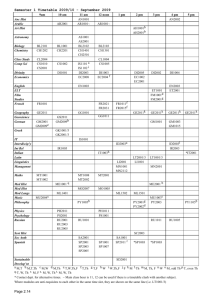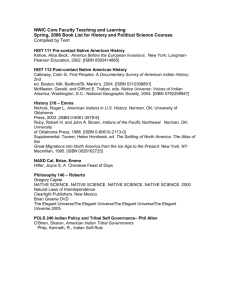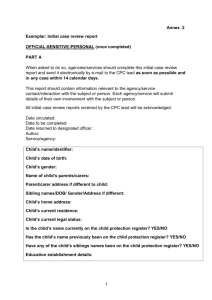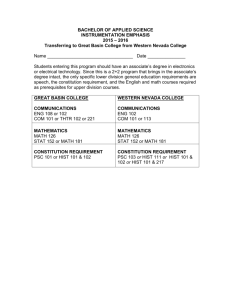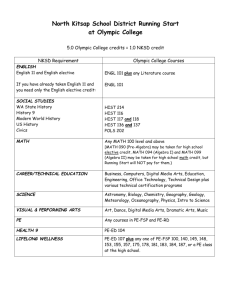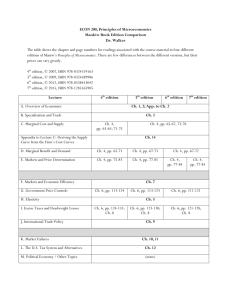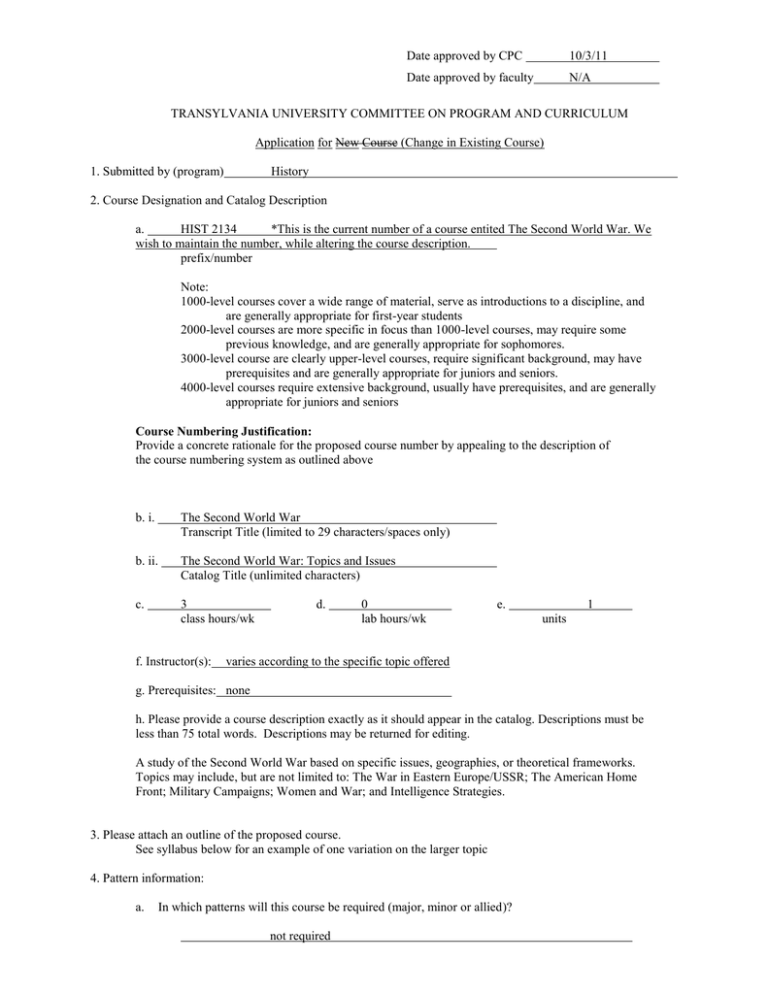
Date approved by CPC
10/3/11
Date approved by faculty
N/A
TRANSYLVANIA UNIVERSITY COMMITTEE ON PROGRAM AND CURRICULUM
Application for New Course (Change in Existing Course)
1. Submitted by (program)
History
2. Course Designation and Catalog Description
a.
HIST 2134
*This is the current number of a course entited The Second World War. We
wish to maintain the number, while altering the course description.
prefix/number
Note:
1000-level courses cover a wide range of material, serve as introductions to a discipline, and
are generally appropriate for first-year students
2000-level courses are more specific in focus than 1000-level courses, may require some
previous knowledge, and are generally appropriate for sophomores.
3000-level course are clearly upper-level courses, require significant background, may have
prerequisites and are generally appropriate for juniors and seniors.
4000-level courses require extensive background, usually have prerequisites, and are generally
appropriate for juniors and seniors
Course Numbering Justification:
Provide a concrete rationale for the proposed course number by appealing to the description of
the course numbering system as outlined above
b. i.
The Second World War
Transcript Title (limited to 29 characters/spaces only)
b. ii.
The Second World War: Topics and Issues
Catalog Title (unlimited characters)
c.
3
class hours/wk
f. Instructor(s):
d.
0
lab hours/wk
e.
1
units
varies according to the specific topic offered
g. Prerequisites: none
h. Please provide a course description exactly as it should appear in the catalog. Descriptions must be
less than 75 total words. Descriptions may be returned for editing.
A study of the Second World War based on specific issues, geographies, or theoretical frameworks.
Topics may include, but are not limited to: The War in Eastern Europe/USSR; The American Home
Front; Military Campaigns; Women and War; and Intelligence Strategies.
3. Please attach an outline of the proposed course.
See syllabus below for an example of one variation on the larger topic
4. Pattern information:
a.
In which patterns will this course be required (major, minor or allied)?
not required
b.
In which patterns may it be chosen as an elective?
History (HIST)
5. Does any part of this course duplicate material already addressed in existing courses? If so, why is this desirable?
This course expands on a topic covered very briefly (2-3 class days at most) in HIST 1024: Western
Civilization and HIST 1164: U.S. history from 1865.
6. How often will this course be offered?
a. Twice a year
b. Fall
Once a year
Winter
Alternate years
May
x
HIST 2134 may be offered in any of these terms.
7. What methods of instruction will be employed?
Lecture, discussion, independent research, and others at the discretion of the instructor
8. Will this course require any facilities, equipment, or personnel not presently available?
If yes, please explain.
NO
9. Will the course require additional library resources (books, journals, online databases)? If yes, please explain.
NO
10. What enrollment is expected?
20
Maximum enrollment desired?
15
11. What is the primary reason this course was proposed?
Three of the 4 FTE historians have expertise in the World War Two era and all have offered a course on the subject,
focusing on their respective areas of expertise. By renaming the course and offering a clearer, more streamlined
description, students will be able to determine whether a particular version of the course will meet their academic
needs and goals.
12. Whom should CPC consult for further information regarding the proposed changes?
Melissa McEuen, Professor of History
*********************************************************************************************
The following sections must be completed before application is considered by CPC:
_________Melissa A. McEuen____________________9/28/2011______
Originated by
Date
Program Director comments:
All History Program members agreed to submitting this proposal to CPC.
____Melissa A. McEuen ___________________9.28.2011____________
Program Director
Date
___________
Division Chair comments:
This change offers clarity and flexibility, and I second Prof. McEuen’s comments.
___Frank Russell___________
______9.30.11_____
Division Chair
Date
_____________________________________________________________________________________________
Division Chair submits form via email to CPC secretary (Michelle Rawlings, mrawlings@transy.edu) and chair
(Michael Pepper, mpepper@transy.edu)
Paste Syllabus here:
TRANSYLVANIA UNIVERSITY
WINTER TERM 2008
HIST 2134 The Second World War
Class Meeting: MW 3:30-4:45, Haupt 202
Instructor: Melissa McEuen
email: mmceuen@transy.edu (I check email in the afternoon not morning)
office phone & voice mail: 859-233-8212
office hours: MWF 12:30-1:30; 2:30-3:30 or by appointment; TTh by appointment
COURSE DESCRIPTION (from the Transylvania University catalog)
A study of the causes, conduct, and results of World War II. Special attention will be given to the
impact of the war on the home fronts. Depending on the years offered, the course will concentrate
on either American or European experiences. IV Note: This year the course focus is the American
experience, therefore the course fulfills a U.S. field requirement in the history major or minor.
COURSE THEMES & QUESTIONS
The course is organized thematically not chronologically. The main themes and questions we will
explore this term are:
a. Motivation—What roles did men and women assume (or were they expected to
assume) during the war? Who or what guided them, inspired them, led them? What
were the effects on these individuals, their families, communities, and the nation?
b. Sacrifice—What was the nature of sacrifice on the American home front? Who
sacrificed? What was gained or lost by certain sacrifices? How did race, gender, sex,
age and ethnicity play into the equation?
c. Memory—In what ways have Americans remembered the Second World War?
What purposes or functions have these memories served? What have been the effects
of the (re)membered or reconfigured past?
To help us answer these questions, we will examine popular histories, oral histories, cultural
studies’ scholarship, as well as primary sources such as wartime film, music, and advertising.
To understand those who lived on the American home front, we need to hear what they heard,
see what they saw, and read what they read. It will help us see beyond and perhaps
understand more fully the creation of the “Good War” and the “Greatest Generation.”
REQUIRED BOOKS (you should purchase these editions)
Michael C. C. Adams, The Best War Ever: America and World War II (Baltimore: Johns
Hopkins University Press, 1994), ISBN 0801846978.
Amy Bentley, Eating For Victory: Food Rationing and the Politics of Domesticity (Urbana:
University of Illinois Press, 1998), ISBN 0252067274.
Linda Gordon & Gary Y. Okihiro, eds., Impounded: Dorothea Lange and the Censored
Images of Japanese-American Internment (New York: Norton, 2006), ISBN 039306073X
Constance Bowman, Slacks & Calluses: Our Summer in a Bomber Factory (1943; reprint ed.,
Washington, D.C.: Smithsonian Institution Press, 1997), ISBN 156098368X
CHOOSE ONE OF THE FOLLOWING:
Doris Kearns Goodwin, No Ordinary Time: Franklin and Eleanor Roosevelt: The Home Front in World
War II (New York: Simon & Schuster, 1994), 752 pp., ISBN 0684804484
Eric Larabee, Commander in Chief: Franklin Delano Roosevelt, His Lieutenants, and Their War
(1987; new paperback edition, Navel Institute Press, 2004), 735 pp., ISBN 1591144558
OTHER REQUIRED SOURCES (available online, in pdf, or on reserve in the Transy library)
Ken Burns, dir., “The War,”(Florentine Films, 2007). (excerpts)
Charity Adams Earley, One Woman’s Army: A Black Officer Remembers the WAC (College Station:
Texas A&M Press, 1989). (excerpts)
James Russell Harris, ed., “Rolling Bandages and Building Thunderbolts: A Woman’s Memories of the
Kentucky Home Front, 1941-45,” Register of the Kentucky Historical Society 100 (Spring 2002):
167-94.
Christina S. Jarvis, The Male Body at War: American Masculinity during World War II (DeKalb:
Northern Illinois Press, 2004), pp. 56-85.
James Lorence, “Government Persuasion: Prelude to War (1943), The Negro Soldier (1944), and the
Issues of War,” in Screening America (New York: Pearson Longman, 2006), pp. 90-103.
Steven Mintz and Randy Roberts, eds., “Wartime Hollywood,” in Hollywood’s America: U.S. History
through its Films (St. James, NY: Brandywine Press, 1993), pp. 155-179.
Leisa D. Meyer, Creating G.I. Jane: Sexuality and Power in the Women’s Army Corps during World War
II (New York: Columbia University Press, 1998), pp. 33-70.
Robert Westbrook, “’I Want a Girl Just Like the Girl That Married Harry James’: American Women and
the Problem of Political Obligation in World War II,” American Quarterly 42 (December 1990):
587-614. (J-STOR)
COURSE REQUIREMENTS (including percentage of final grade)
Preparation & Participation, 30%
Consider yourself an active contributor to the class’s success. Strive to be an informed,
curious and respectful discussant of texts and ideas. When taking notes on assigned
reading, keep in mind the course themes and questions; these will help you determine
what is significant and keep you from getting bogged down in minutiae. I may give you
specific questions to consider while you’re reading; these will help prepare you for class
discussion, as well as for papers, presentations, and exams. Please bring to class your own
copy of each assigned source, along with the notes you have taken on it, on the day it’s up for
discussion.
Attendance Policy: Up to two absences will not affect your final grade if your class
participation otherwise is strong; more than two absences will definitely affect your final
grade, as will chronic tardiness or a disruptive cell phone.
Response Papers & Essays, 30%
Each paper or essay should reveal your earnest attention to the reading assignment. I may
give you a prompt in advance (and ask you to bring in a prepared response) or I may ask
you to write a brief essay at the beginning of class. To write the in-class essays, you may
use any notes you’ve taken on the reading assignment; you may not, however, use the
books or articles themselves. Should you miss an in-class essay due to absence or fail to
bring a paper to class, you may take a test on the assignment.
Midterm Exam, 20%
Your exam will consist of IDs, short answer questions, and essay questions.
Group Research Project Presentation, 10%
After spring break, you and a few others will share your research on a selected topic
with the class. You may wish to study the construction and use of atomic bombs, the
swing band craze, POW camps in the American South, or any of the other endless
possibilities. I’ll distribute specific guidelines about the project in early March.
Final Paper, 10%
Your paper will highlight your own research and its relationship to your group’s
research project. I’ll distribute guidelines well in advance of the deadline.
*The schedule and procedures outlined are subject to change in the event of extenuating circumstances.
EVALUATION PROCEDURES
I will write comments and questions on your papers and exams, encouraging you to work on
particular elements in your expository writing. After each class meeting, I will take brief notes on
your participation, especially the depth of your observations and the extent to which you
advanced the discussion in a meaningful way. In assigning letter grades, I follow the University
Grading System criteria outlined in the 2007-08 Catalog.
DAILY SCHEDULE OF DISCUSSION TOPICS AND READING ASSIGNMENTS
January
7
Epistemology -- How do you know what you know about the U.S. and World War II?
9, 14
Memories and Myths…….……………………….…………………Adams, chapters 1, 2, 3, 4
16, 23 Memories and Myths…..…………………Harris article; Earley excerpts; Burns, “The War”
28, 30 Leaders and Followers……Goodwin, No Ordinary Time OR Larrabee, Commander in Chief
February
4, 6
Leaders and Followers…………………………………..……Jarvis chapters; Meyer chapters
11
Midterm Exam
13
Sacrifice.………………………………………………………………Adams, chapters 5 & 6
18, 20 Sacrifice.……………………………………………………………Bowman, Slacks & Calluses
25, 27 Sacrifice.…………………………………………………………….Bentley, Eating for Victory
March
3, 5
Sacrifice.………………………………………………Gordon and Okihiro, eds., Impounded
Spring Break
17, 19 Why They Fought……..………………………………Lorence chapter; Westbrook article
Screenings, Prelude to War and The Negro Soldier, TBA
24
Why They Fought…………………………Mintz and Roberts, eds., “Wartime Hollywood”
26, 31 Group Research Project Presentations
April
2, 7
Group Research Project Presentations
9
Conclusions…………................................................................Adams, chapter 7 & Afterword
14
Final Paper Due
“Never persuade yourself that war, no matter how necessary, is not a
crime.” -- Ernest Hemingway (favorite quote of Paul Fussell, WWII vet)

